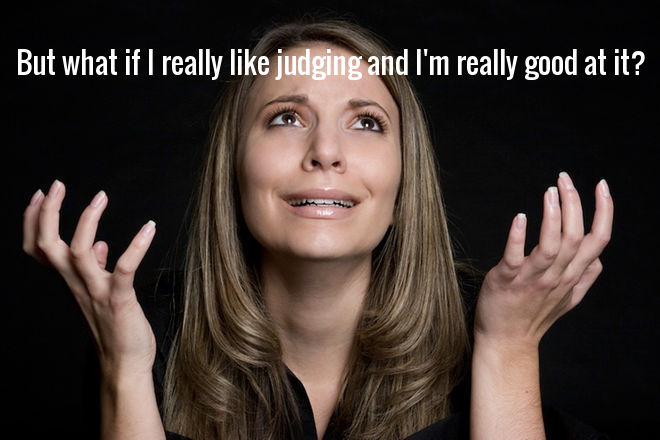It can be hard, in a house with three small children, to have any kind of adult conversation. That’s why when my husband I do manage to talk, these conversations often take place in pieces. A few minutes here, a few minutes there, a handful of texts exchanged during the day.
Often we’ll start a conversation on the way home from church that spans into the week, and this week we’ve been talking about judgment. It started because of something Andrew said in our adult Sunday School class. I might be paraphrasing here, but he said “Jesus started with love. Until I can love someone like Jesus does, I can’t judge them.”
“But…”
Because judgment is one of those topics in faith. We say “well, we can’t judge” as we’re judging someone. We can judge someone for being too judgmental. We can spin it into a slippery slope argument (well, if you can’t judge, how are you supposed to know right from wrong?). It’s very easy for conversations about judgment to get tangled up and go nowhere.

This is the famous “judge not” verse in the gospel of Matthew (7:1-2, Contemporary English Version):
Don’t condemn others, and God won’t condemn you. God will be as hard on you as you are on others! He will treat you exactly as you treat them.
It’s the second part that always chills me. The NIV version talks about being judged by the same measure, which always makes me picture a scale where all the judgments I’ve made are piled up on one side, dragging the ground.
So here’s a straightforward, unambiguous commandment. Don’t judge. Great. Conversation over.
Except that it’s not, because everyone will invariably respond with, “But what about pedophiles? What about murderers? What about people who throw their trash out of car windows? It’s okay for us to judge them, right?”

I think part of this is a language issue. “Judgment” in our context, is not always a bad thing. I try to exercise good judgment with my money. I weigh a lot of factors before making a large purchase, and I try to make sound decisions that will benefit our household. We call that judgment.
But that’s not what Jesus is referring to in Matthew, which is why I like the CEV better than the NIV. Jesus is talking about condemnation. He’s talking about the human reflex that allows us to rationalize our own flaws while looking down the weaknesses of others.
So can we condemn pedophiles? Murders? Litterbugs?
Andrew and I continued talking about this through the week and this is the answer that he came up with. He said we absolutely can condemn the actions. We can and should condemn the sexual exploitation of children. We can condemn murder. We can condemn littering.
But we can’t condemn the person.
And this is where it really gets tricky, because what does that look like in practice?
Jesus condemned the actions of the money lenders and the people who were economically exploiting others, but when he saw Zacchaeus, a dishonest tax collector, he called out to him and invited him into his presence.
And yes, Zacchaeus repented, but Jesus reached out in love first. It wasn’t conditional. Jesus didn’t say “repent and then I’ll eat with you.”
Of course, Jesus, being Jesus, knew Zacchaeus’ heart. We might reach out in love and never see it followed by repentance. The only repentance schedule we really have any control over is our own.

I came across this passage in Romans this week (13:8-10, CEV again):
Let love be your only debt! If you love others, you have done all the Law demands. In the Law there are many commands, such as, “Be faithful in marriage. Do not murder. Do not steal. Do not want what belongs to others.”
But all of these are summed up in the command that says, “Love others as much as you love yourself.” No one who loves others will harm them. So love is all that the Law demands.
It’s a shame that “love,” much like “judgment,” is also a word that we can’t seem to agree on the meaning or the application of. I’ve heard many people argue that judgment IS love, and they would want someone to point out their sin if they were the one sinning.
That is, of course, a steaming load of horse manure.
Because there is no “if.” We all have plenty of sin in our lives. And most of us go to the church on Sunday safe in the knowledge that no one will call us out on it.
And that’s what we want, isn’t it? That’s how we want to be treated. We want to be given the benefit of the doubt. We want time and space to work through our issues. We want to be accepted as a flawed, complicated human being.
We want to be loved.
It’s so much easier to accept that grace than it is to give it.
Well written! And I remember the days of those conversations whenever you could fit them in! Having a uninterrupted conversation again will happen, trust me 🙂 but again good thoughts that you shared!
LikeLike